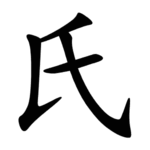Radical 83
 From Wikipedia the free encyclopedia
From Wikipedia the free encyclopedia
| 氏 | ||
|---|---|---|
| ||
| 氏 (U+6C0F) "clan" | ||
| Pronunciations | ||
| Pinyin: | shì | |
| Bopomofo: | ㄕˋ | |
| Wade–Giles: | shih4 | |
| Cantonese Yale: | sih, jī | |
| Jyutping: | si6, zi1 | |
| Pe̍h-ōe-jī: | sī | |
| Japanese Kana: | シ shi (on'yomi) うじ uji (kun'yomi) | |
| Sino-Korean: | 씨 ssi | |
| Names | ||
| Japanese name(s): | 氏/うじ uji | |
| Hangul: | 성 seong | |
| Stroke order animation | ||
 | ||
Radical 83 or radical clan (氏部) meaning "clan" is one of the 34 Kangxi radicals (214 radicals in total) composed of 4 strokes.
In the Kangxi Dictionary, there are 10 characters (out of 49,030) to be found under this radical.
氏 is also the 89th indexing component in the Table of Indexing Chinese Character Components predominantly adopted by Simplified Chinese dictionaries published in mainland China.
Evolution
[edit]- Oracle bone script character
- Bronze script character
- Large seal script character
- Small seal script character
Derived characters
[edit]| Strokes | Characters |
|---|---|
| +0 | 氏 |
| +1 | 氐 民 |
| +2 | 氒 |
| +4 | 氓 |
Sinogram
[edit]As an independent Chinese character. It is one of the kyōiku kanji or kanji taught in elementary school in Japan.[1] It is a fourth grade kanji.[1]
- In Japanese it refers to Japanese clans or uji.
- It also refers to Ujigami (氏神) which are gods originally limited to clans which are now worshipped by everyone in a region.
- In Chinese it refers to Chinese clan surnames. Historically Chinese surnames had two levels with the higher level xing (Chinese: 姓; pinyin: xìng) shared by many people and the lower level shi (Chinese: 氏; pinyin: shì) which was frequently changed. Similar to Roman nomen and Cognomen
Literature
[edit]- Fazzioli, Edoardo (1987). Chinese calligraphy : from pictograph to ideogram : the history of 214 essential Chinese/Japanese characters. calligraphy by Rebecca Hon Ko. New York: Abbeville Press. ISBN 0-89659-774-1.
- Lunde, Ken (Jan 5, 2009). "Appendix J: Japanese Character Sets" (PDF). CJKV Information Processing: Chinese, Japanese, Korean & Vietnamese Computing (Second ed.). Sebastopol, Calif.: O'Reilly Media. ISBN 978-0-596-51447-1.
References
[edit]- ^ a b "The Kyoiku Kanji (教育漢字) - Kanshudo". www.kanshudo.com. Archived from the original on March 24, 2022. Retrieved 2023-05-06.



